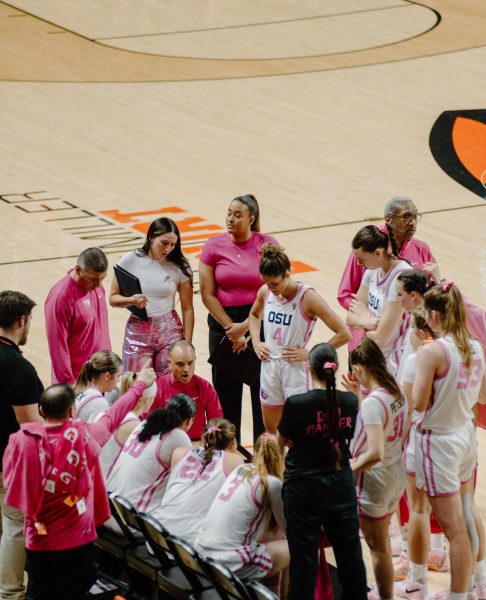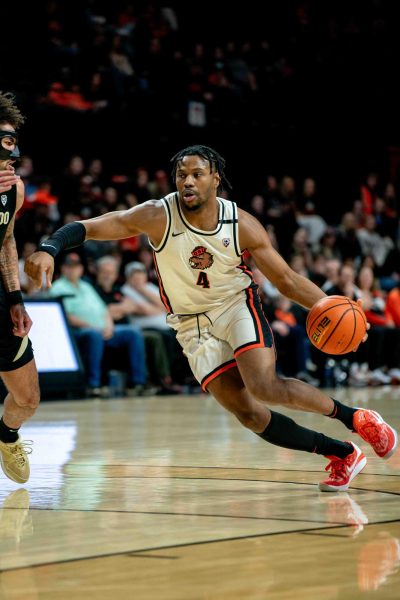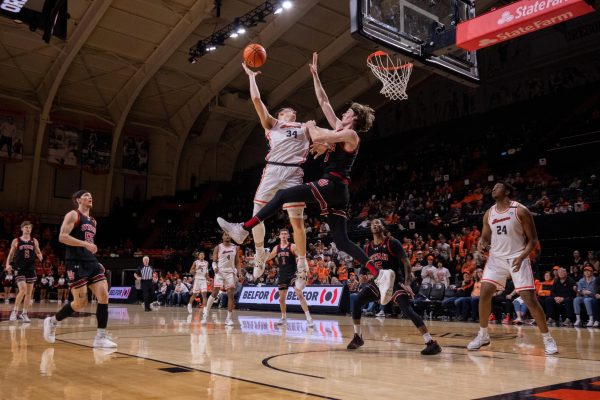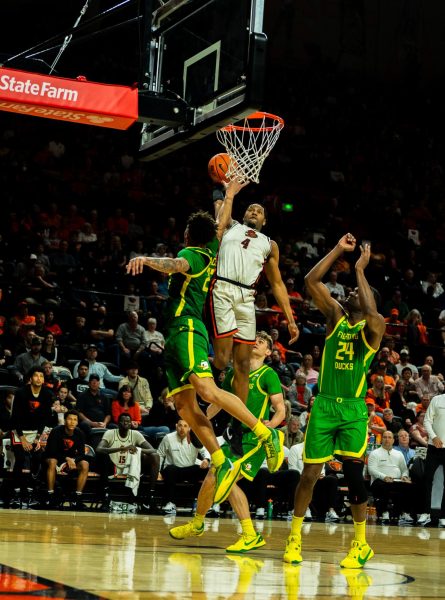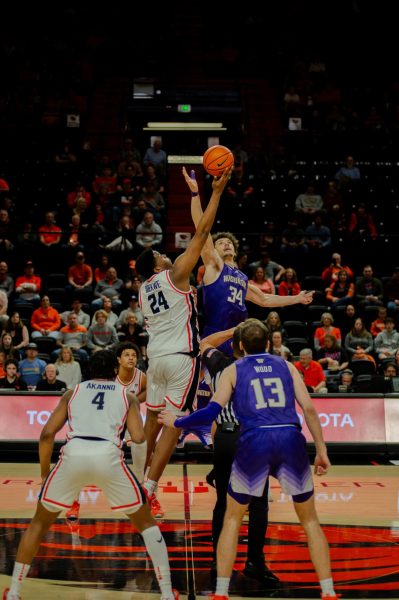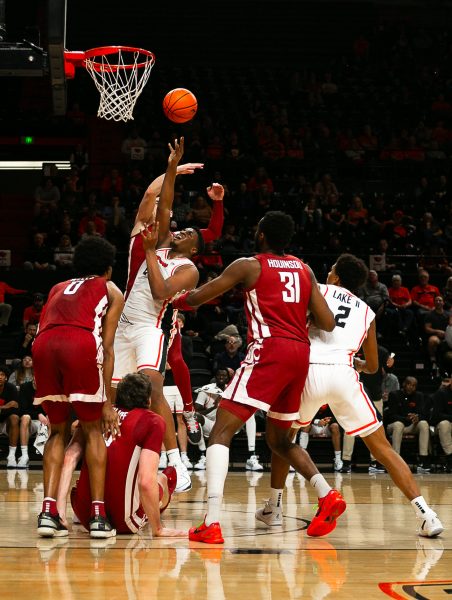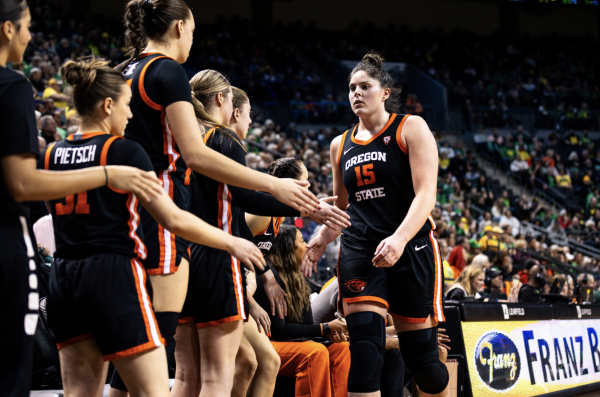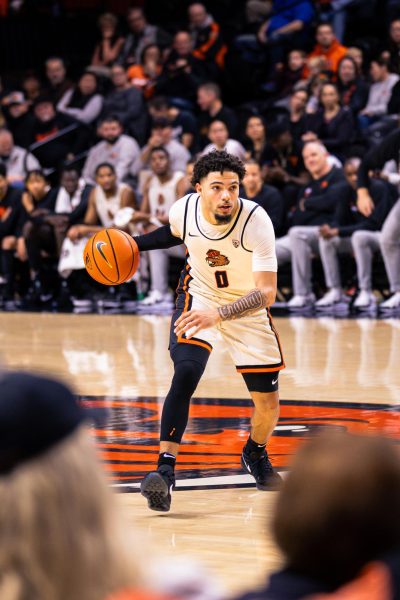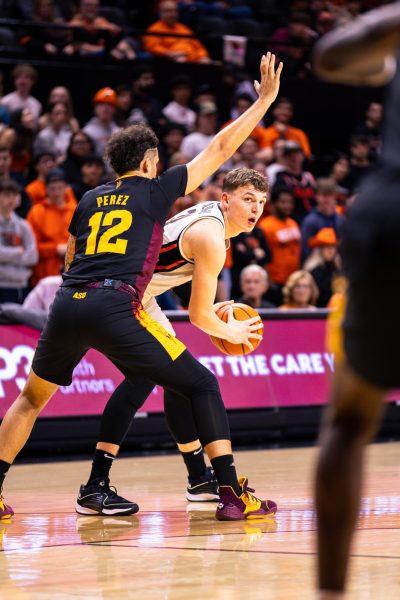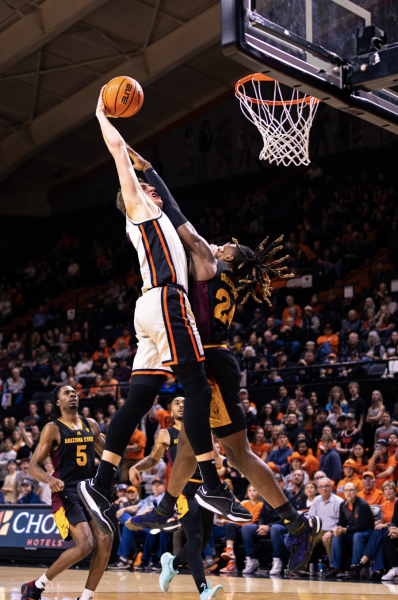Time on the bench leaves OSU freshman guard Derrick Bruce anxious for play
February 16, 2016
Derrick Bruce hates the bench.
He is not comfortable sitting on the sidelines while his teammates play, and he never has been. Oregon State’s freshman guard thought he could get significant playing time this season when he committed to OSU, but his 5.8 minutes per Pac-12 game this season, including the four games he did not play in at all, have not met his hopes.
Saturday’s game against California was different, in which Bruce played 14 minutes and posted career highs of 11 points and three 3-pointers, but he also did not leave the bench in Thursday’s win at Stanford.
“Before coming here, I expected I would be playing a lot more than I am,” Bruce said.
He does not mean to disrespect head coach Wayne Tinkle, who Bruce says has been “up front” this year about why he has not been playing much. In fact, some of those reasons have been off-court issues: Bruce now admits he did not always show up to study halls or team meetings on time earlier in the year, and coaches were not pleased with his lack of focus.
So, Bruce changed. He had to.
The memories of his junior year in high school being cut short still lingered. Four games into the season at Colony High in Moreno Valley, Calif., Bruce broke his ankle. The doctors told him the injury was bad, enough that he might never play basketball again.
“It was the worst time of my life,” Bruce said. “I really hated sitting out and not playing. It’s the worst thing I ever did.”
“I saw him cry, and he really doesn’t do a lot of crying,” added his mother, Karen Oilter. “He was devastated.”
Bruce was not used to life without basketball. His mother says she first saw his competitive drive on the court at age two, and it has not dropped off since. The injury as a junior affected more than just Bruce’s ankle. Without basketball as his outlet, his grades started slipping and nothing felt in place.
“It affected everything,” he said. “I was depressed.”
Though doctors doubted Bruce would play again, the teenager dismissed those thoughts. He started playing on the ankle anyways, months before he was eventually cleared to exercise. When his doctor asked about Bruce’s activities, Bruce would lie and say he had not been playing.
“I just found any way I could play,” he said. “I just hate sitting out.”
On to OSU
Bruce healed by his senior season and averaged 21.3 points a game, but missing his junior year hindered recruiting interest, so he detoured to West Oaks Academy in Orlando for a year and then committed to OSU as a three-star recruit. The 6-foot-3, 165-pounder is averaging 2.6 points per game in limited playing time, which has been almost as tough for Bruce as his junior year of high school.
First, his role was limited due to defensive problems. Then, he showed up to some meetings late. It culminated in the road game in Salt Lake City against Utah. Coach Tinkle decided not to bring Bruce with the team on the trip, and Bruce had to watch the game from Corvallis.
Bruce does not like to talk in detail about his playing time, but he has been appreciative of Tinkle’s forwardness this season. Spending time on the bench, however, has been strenuous.
“I really do respect (Tinkle), I just really want to play. That’s the only thing,” Bruce said. “He’s a good person, just the only thing is me not playing. I just can’t deal with it.”
The last few weeks of practice, Bruce has often been the first one to show up. He’s made similar strides in attending team meetings on time as well. Just about every week, Tinkle will pull Bruce aside to talk about his progress. Bruce, Tinkle says, has expressed his frustrations “in a positive way,” and the communication has been open.
“Academically, his meetings and those responsibilities, we don’t ever take those things lightly,” Tinkle said. “So there were some growing pains, and he’s done much better here in the last month.”
Still, Bruce hasn’t seen the floor much. He’s in the process of building consistency—this year he’s shooting 52.6 percent on 3-pointers and 12.9 percent on 2-point attempts—there’s simply not much playing time to go around, especially with senior guard and Naismith Award contender Gary Payton II hoarding 34.2 minutes a game.
“There have been ups and downs,” said Bruce’s roommate Kendal Manuel, a freshman guard sitting out this year with a broken leg. “We’re both in the same boat. We’ve just got to stay focused and know what we want from this.”
When things have been most taxing, there’s one person Bruce most often turns to: his mother, who still lives in California. She saw her son go through the ankle injury three years ago, and her words now in their daily phone conversations still have magnitude in Bruce’s ears. Even when Bruce calls her “pissed off” about his playing time, she keeps him levelheaded.
“My mom’s been great. The most important person in my life right now,” Bruce said. “She just tries to keep me in the right frame of mind. You know, I’m 20 years old. I’m a kid. I’ll be thinking outrageous, in-the-moment type things, so she talks with me and settles me down.”
Oilter’s message to her son: “Wait your turn. Timing is everything,” she said.
The calls can last up to three hours, Bruce said. Sometimes when his mom’s name pops up on his phone, Bruce will ignore the call to avoid another lengthy conversation, only to change his mind and call her back.
“My momma can talk,” he said with a laugh.
Looking Ahead
Bruce doesn’t know exactly when his breakout moment will be. Maybe it will be later this season, maybe next year. His role will likely increase as a sophomore after guards Payton II and Langston Morris-Walker both graduate.
“If it comes to next season, it comes to next season,” Bruce said, whose foresight has not gone unnoticed by his teammates.
“He’s changed a lot,” said freshman forward Gligorije Rakocevic, who also lives with Bruce and Manuel in the dorms. “He’s been working way harder right now and I’m guessing he’ll have a chance to play more.”
Bruce points to senior forward Daniel Gomis as the teammate who has mentored him most. Gomis has spent his fair share of time on the bench in his career at OSU, mainly due to a variety of injuries, and Gomis’ support has been key for Bruce. The two spent a lot of time together this summer before the season began, one player nearing the end of his collegiate career giving advice to a teammate without a college game under his belt.
“We all went through this,” Gomis said. “You get to the point where you’re competing with so many other positions on your team, you’ve just got to compete and bring it every day in practice. I think he’s been doing that.”
Bruce’s goals are not just to play more. He would definitely like to, but he has a bigger vision. He admits that he and coach Tinkle do not always see “eye to eye,” but his aspiration in the next few years is specifically to be a determined player for his head coach.
“My hope is to find Tinkle out and be as good as I can be for him,” Bruce said. “There’s a lot of things that I wouldn’t know that I’m doing that are making him mad. So I’m just trying to find those things out and cut back on them. I’m just trying to be the best player I can be here.”














































































































